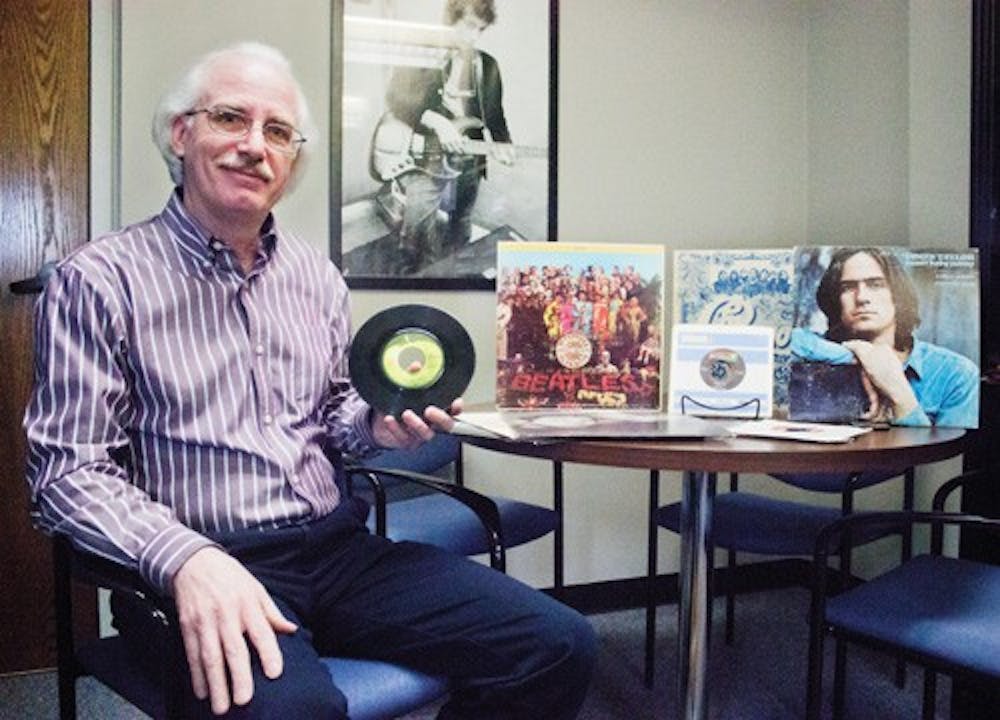'Dig a little deeper': Rock history professor connects music, family, U.S. history into course
Mitchell Hall remembers 1968 like it was yesterday.
After all, he was 13 years old and impressionable, and he had just bought his first rock n’ roll record: "Hey Jude" by The Beatles.
“It just starts with the singing,” Hall said. “It's a very distinct sound. Even now when I hear that, I just don't get tired of that.”
Written to John Lennon's son, Julian, about the breakup between he and his first wife Cynthia, "Hey Jude" sat at No. 1 for nine-straight weeks from Sept. 28 to Nov. 23 on the Billboard Hot 100 singles chart – all facts that Hall can rattle off the top of his head with superhuman ease.
As CMU’s resident chronicler of rock n’ roll, Hall teaches students the ins-and-outs of rock music in his History of the Rock and Roll Era course.
His class specializes not just on The Beatles' styles, but other artists spanning myriad genres including grunge, punk, metal, folk and southern rock.
Hall’s class isn’t just a blow-off course for hip seniors – it is a big draw for history buffs in general.
“Along the way, I provide historical context through discussion of such things as the emerging youth culture, of the social movements in the 1960s, of the Watergate scandal in the 1970s, the economic issues in the 1970s as well,” he said. “I move through the music topically and try and put it into the larger social and historical context.”
Hall joined the CMU teaching faculty in 1989, nearly 10 years before creating the history of rock class. He received his Ph.D. in recent U.S. history from the University of Kentucky in 1987, and taught for two years at both Indiana and Purdue universities in Indianapolis.
Aside from teaching courses at CMU, Hall wrote the book on rock n’ roll, so to speak.
His newest historical tome, titled “The Emergence of Rock and Roll: The Rise of American Youth Culture,” is set to hit shelves this year.
The class and the book are testaments to why he loves rock music so dearly.
“The songs that I really like are the songs that inspire some sort of righteous indignation or something,” Hall said. “I hear (The Who’s ‘We Won’t Get Fooled Again’) and I feel like Pete Townsend felt like when he wrote that song: 'Man, we should've done better. We should've taken advantage of something when it was here.’”
Hall is more than just a historian – he’s a music fanatic with a personal musical history. From Lexington, Ky., he and his family are full of musical talent or involved with music in some way.
“My youngest brother, Matthew, in addition to playing guitar, has built some electric guitars,” he said. “My mother Alice is a keyboard player, pianist and organ player and sings.”
Dale, his minister father and a singer in multiple musical groups, had his children listen to the uplifting sounds of gospel music instead of rock 'n' roll.
There's even a Grammy winner in the family: His other brother Marshall won the award in 2008 for his baritone singing on the Gaither Vocal Band's “Lovin' Life” album in the Best Southern, Country, Or Bluegrass Gospel Album category.
Tim Hall, associate dean of the College of Humanities and Social and Behavioral Sciences, with no relation to Mitchell, said having an intrepid professor teach a class on rock is beneficial both for history majors and the casual student alike.
Rock music, Tim Hall explained, acts as a pulse of the American public and does not stand apart from the world that is happening around it.
“It's a great way for students, how people on the street, how the U.S. population responded to various movements,” Tim Hall said. “It becomes important on gaining a broader and deeper perspective on the texture of American life in the time period you're studying."
Lance Jarvis is a Sacramento senior who loves rock and roll, such as Led Zeppelin or Crosby, Stills and Nash. The course was a perfect fit for him.
“I knew most of their songs, but I didn't know the history behind them, so I was really interested in that,” Jarvis said. “There's a huge background in every song that there is.”
Being able to teach music history to those like Jarvis, who have loved the tunes for years but knew nothing of what went into them, is a dream come true for Mitchell Hall.
“Being a professional historian is really my dream job,” he said. “If there was one thing I might give it up for, it's if I could be James Taylor, but I can't, so I'm very happy with having this job.”




